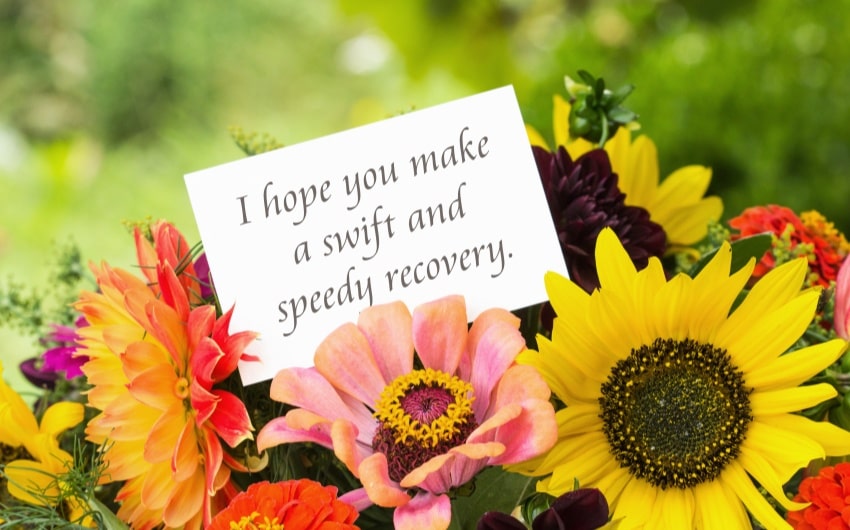How to Say Get Well Soon Professionally: 37 Effective Phrases
In the professional world, showing empathy and support is crucial, especially when a colleague or business associate is unwell. Knowing how to say get well soon professionally can make a significant difference in maintaining positive relationships.
Whether it’s a coworker, a client, or a supervisor, finding the right words to express your concern can be challenging. In this article, we’ll explore effective and thoughtful ways to convey your well-wishes, ensuring your message is both kind and professional. These tips and examples will help you navigate this sensitive situation with ease and grace.
Simple and Direct Messages

When it comes to expressing get well soon wishes in a professional setting, keeping your message simple and direct can be both effective and appropriate. These messages are straightforward, easy to understand, and convey your well-wishes without delving into personal details. Here are some simple and direct messages along with explanations on when and how to use them:
1. “Wishing you a speedy recovery.”
This is a classic and concise way to express your hope that the recipient will recover quickly. It’s suitable for any professional relationship, whether you’re addressing a colleague, supervisor, or client. The brevity of this message makes it perfect for a quick email or a card.
2. “Hope you feel better soon.”
This message is friendly yet professional. It shows your concern and well-wishes without being overly personal. It’s a versatile phrase that works well in most professional contexts, from internal communications to client interactions.
3. “Get well soon and take care.”
Adding “take care” to the message provides an extra touch of empathy, reminding the recipient to prioritize their health. This message strikes a good balance between professionalism and personal warmth.
4. “Best wishes for a swift recovery.”
This phrase is slightly more formal, making it ideal for situations where a more respectful tone is needed, such as when addressing a higher-up or a valued client. It conveys your wishes politely and professionally.
5. “Sending you my best wishes for a quick recovery.”
This message is professional yet personal enough to show that you genuinely care. It’s suitable for colleagues and clients alike and works well in written communications like emails or cards.
6. “We’re all thinking of you and wishing you a speedy recovery.”
By including “we’re all,” this message indicates collective support from your team or organization. It’s particularly effective in maintaining a sense of community and support within a workplace.
7. “Wishing you a quick and easy recovery.”
This is a straightforward message that emphasizes both speed and ease of recovery. It’s appropriate for any professional relationship and shows your concern in a clear and simple manner.
8. “Take the time you need to heal and recover. We look forward to your return.”
This message not only wishes the recipient well but also acknowledges the importance of taking the necessary time to heal. It reassures them that their presence is valued and anticipated, which can be comforting and motivating.
Empathetic and Supportive Messages
In a professional setting, showing empathy and support when someone is unwell can significantly impact your relationship. Empathetic and supportive messages go beyond simple well-wishes, demonstrating a deeper level of care and consideration. Here are some examples of empathetic and supportive messages along with explanations on when and how to use them:
1. “Take the time you need to rest and recover. We look forward to your return.”
This message acknowledges the importance of the recipient’s health and encourages them to prioritize their recovery. It also expresses anticipation for their return, reinforcing their value to the team or organization. This is particularly suitable for colleagues or team members who might feel pressured to return quickly.
2. “Our thoughts are with you as you recover.”
This phrase conveys collective empathy and support from the team or organization. It shows that the recipient is not alone and that their well-being is important to everyone. This is appropriate for both colleagues and clients, providing a sense of communal support.
3. “Your health is our top priority. Take all the time you need to get well.”
This message emphasizes that the recipient’s health is more important than any work-related concerns. It’s a strong statement of support that can help alleviate any stress or guilt the recipient might feel about taking time off. This is particularly effective in hierarchical relationships where the recipient might worry about their responsibilities.
4. “Wishing you a restful and speedy recovery. Your well-being is important to us.”
This message combines the desire for a quick recovery with an emphasis on rest, highlighting the importance of taking it easy. It also reassures the recipient that their well-being is a priority, suitable for both internal colleagues and external business associates.
5. “Please focus on your health and take the time you need to recover fully. We’re here to support you.”
Encouraging the recipient to focus on their health and offering support conveys deep empathy and care. This message is ideal for close colleagues or valued team members, reinforcing that their recovery is more important than their immediate return to work.
6. “We miss your contributions and look forward to having you back with us soon.”
By highlighting the recipient’s contributions, this message boosts their morale and emphasizes their importance to the team. It combines empathy with encouragement, making it a great choice for team members whose presence and work are highly valued.
7. “Your strength and positivity are an inspiration to us all. Get well soon.”
This message acknowledges the recipient’s personal qualities, offering encouragement and inspiration. It’s a way to boost the recipient’s spirits by reminding them of their positive impact on others. This is suitable for both colleagues and clients who have demonstrated resilience and positivity.
8. “We’re all rooting for your speedy recovery. If there’s anything we can do to help, please let us know.”
This message combines well-wishes with an offer of assistance, showing a proactive approach to support. It reinforces the sense of team spirit and willingness to help, suitable for close-knit teams or collaborative work environments.
9. “Take good care of yourself. We’re here to cover for you and support you every step of the way.”
This message reassures the recipient that their responsibilities will be managed in their absence, reducing any anxiety about their workload. It emphasizes the team’s readiness to support, making it ideal for key team members or leaders.
Formal and Respectful Messages

When it comes to professional settings, particularly in hierarchical relationships or interactions with clients, a formal and respectful tone is often required. These messages convey empathy and support while maintaining the appropriate level of professionalism. Here are some examples of formal and respectful messages along with explanations on when and how to use them:
1. “Please accept our best wishes for a full and swift recovery.”
This message is formal and respectful, making it suitable for clients, senior executives, or business associates. It conveys a sincere wish for the recipient’s health without being overly familiar.
2. “We are sorry to hear about your illness and wish you a quick and complete recovery.”
Expressing sorrow for the recipient’s situation adds a touch of empathy, while wishing them a complete recovery shows genuine concern. This message is appropriate for professional relationships where a higher level of respect is required.
3. “Our thoughts and best wishes are with you during this difficult time. We hope you have a speedy recovery.”
This message combines formality with empathy, acknowledging the recipient’s situation as difficult and expressing hope for their recovery. It’s suitable for formal business contexts, including communications with clients and higher-ups.
4. “We wish you a swift return to good health and send our warmest regards.”
Adding “warmest regards” to this message gives it a slightly more personal touch while maintaining formality. It’s ideal for situations where you want to convey respect and warmth simultaneously.
5. “Our entire team is thinking of you and wishing you a quick recovery. Your health is very important to us.”
This message expresses collective concern from the team, reinforcing the importance of the recipient’s health. It’s suitable for senior leaders or valued clients, showing that their well-being is a priority for the entire organization.
6. “We hope you have a smooth and speedy recovery. Please take all the time you need to get well.”
This message is formal yet supportive, encouraging the recipient to prioritize their health. It’s appropriate for professional settings where a balance of respect and empathy is needed.
7. “Sending you our best wishes for a speedy recovery. We look forward to your return.”
This message is respectful and forward-looking, expressing anticipation for the recipient’s return while wishing them well. It’s suitable for colleagues, clients, or business associates.
8. “We extend our sincere wishes for your speedy recovery and good health. Please let us know if there is anything we can do to assist you during this time.”
This message combines formality with an offer of assistance, showing a high level of professionalism and care. It’s ideal for clients or senior members of the organization, reinforcing your support and willingness to help.
9. “Our heartfelt wishes for a swift recovery are with you. Your well-being is of utmost importance to us.”
Using “heartfelt wishes” adds a touch of empathy to this formal message, making it suitable for senior executives or important business associates. It emphasizes the recipient’s importance and your concern for their well-being.
10. “We are thinking of you and hoping for your quick return to good health. Your presence is missed, and we look forward to seeing you soon.”
This message is formal and respectful while also expressing the recipient’s value to the team or organization. It’s suitable for professional contexts where maintaining a respectful tone is crucial.
Messages for Clients or Business Associates
In professional settings, it’s essential to maintain a balance of empathy and professionalism when wishing clients or business associates a speedy recovery. These messages should convey your concern and support while upholding the decorum expected in business relationships. Here are some examples of messages for clients or business associates along with explanations on when and how to use them:
1. “We hope you make a swift and smooth recovery. Your health is our top priority.”
This message emphasizes the importance of the client’s or associate’s health, showing that you value their well-being above business matters. It’s suitable for all professional interactions, especially when you want to convey strong support and care.
2. “Best wishes for a speedy recovery. Please let us know if there is anything we can do to assist during this time.”
By offering assistance, this message demonstrates your willingness to help and support the client or associate. It’s a professional way to show empathy and offer practical support, reinforcing the strength of your business relationship.
3. “We were sorry to hear about your illness and wish you a quick and complete recovery.”
Expressing sorrow for the illness adds a touch of empathy, while wishing a quick and complete recovery conveys your concern. This message is appropriate for clients or associates where a formal and respectful tone is required.
4. “Our thoughts are with you during this time. Wishing you a swift return to good health.”
This message shows collective support from your team or organization. It’s suitable for clients or business associates, highlighting your shared concern and empathy.
5. “We are thinking of you and hoping for your speedy recovery. Your well-being is very important to us.”
Emphasizing the importance of the recipient’s well-being reinforces your commitment to their health. This message is ideal for maintaining a strong, supportive relationship with clients or business associates.
6. “Sending you our best wishes for a quick recovery. Please take all the time you need to get well.”
This message combines well-wishes with encouragement to prioritize health, suitable for any professional context. It shows respect for the recipient’s situation and underscores the importance of their full recovery.
7. “Our entire team is wishing you a speedy recovery. Please reach out if there is anything we can do to support you.”
By mentioning the entire team, this message conveys a unified sense of support and care. It’s suitable for clients or business associates, showing that your organization values their health and is ready to help.
8. “We were saddened to hear about your health issues. Wishing you a fast and smooth recovery.”
Expressing sadness adds a personal touch, while wishing a fast and smooth recovery keeps the message professional. This is appropriate for business associates where a slightly more personal tone is acceptable.
9. “Wishing you strength and a speedy recovery. We look forward to your return to full health.”
This message combines a wish for strength with well-wishes for recovery, suitable for clients or associates. It conveys both empathy and optimism for their recovery.
10. “Our thoughts and prayers are with you as you recover. Please do not hesitate to let us know if we can assist you in any way.”
Including “thoughts and prayers” adds a deeper level of empathy, suitable for clients or associates where this language is appropriate. Offering assistance reinforces your support and willingness to help.
Tips for Crafting Professional Get Well Soon Messages
1. Keep It Concise: Ensure your message is brief and to the point. Avoid lengthy or overly detailed messages.
2. Maintain Professionalism: Use formal language and avoid slang or overly casual expressions.
3. Show Genuine Care: While maintaining professionalism, ensure your message conveys genuine empathy and concern.
4. Respect Privacy: Do not inquire about the specifics of the illness unless the recipient has already shared them. Focus on well-wishes rather than details.
5. Be Positive: Use positive and encouraging language to uplift the recipient.
6. Personalize When Appropriate: If you have a closer relationship with the recipient, a more personalized message can be appropriate, but still maintain a level of professionalism.
7. Timing Matters: Send your message promptly after learning about the recipient’s illness to show timely support.







